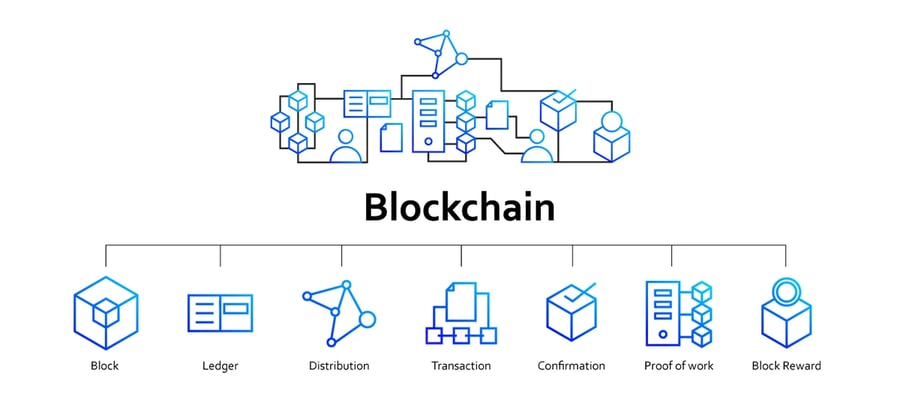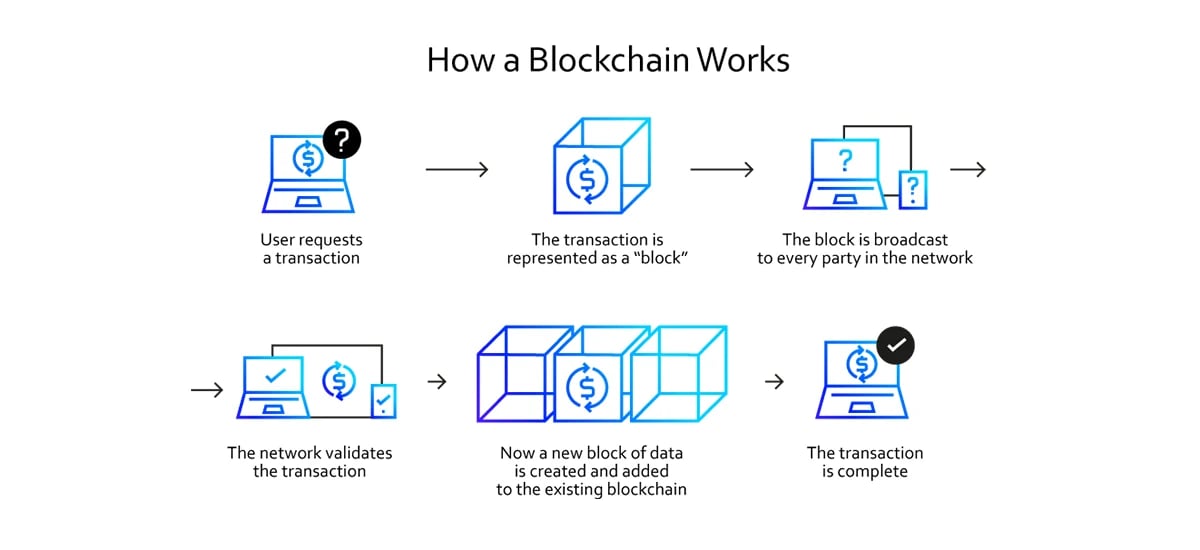Most Recent
Most Recent
Most Recent
Most Recent
Most Recent
Most Recent


The journey to implementing blockchain technology isn't an easy one, but it is mission-critical. Companies that fail to adopt blockchain will experience disruption in the near future. But, before you start the journey to blockchain, there are five things you need to consider.

Blockchain is a public ledger or chain of transactions stored in block-like structures. This format allows for security and transparency so that multiple parties can participate in an open distribution.
Each block in the chain contains information. This information can be anything from voting records to medical records, tokens that represent value to contracts between different parties, and even Cryptos.

We should think about the blockchain as another class of thing like the Internet…
But the blockchain concept is even more; it is a new organizing paradigm for the discovery, valuation, and transfer of all quanta (discrete units) of anything, and potentially for the coordination of all human activity at a much larger scale than has been possible before.
We already established that blockchain is a technology that stores transactions in a distributed way. Its trust lies within the technology instead of the people or the organizations — but how does it work?
When a transaction begins, User A is requesting the launch of the transaction. The transaction is then verified and stored in a block. That block goes out to other nodes in the party, and once they validate the transaction, the new block joins the chain. Anyone can now view the new block and all the data associated with it — such as transaction dates, time stamping, and user information stored in the block.
A good example of this is a consumer purchasing a laptop with a warranty.
A consumer purchases a laptop with a warranty. Their purchase gets stored on the block with all the other information regarding this specific laptop and his customer information. Their purchase is confirmed and is added to the chain as a new block. The warranty provided could then see all of the data associated with the purchase and confirm the warranty details if the customer ever files a claim.
There are four different types of blockchain; however, they share many similarities. For example, all blockchain operates on a peer-to-peer system between different nodes.
Each of the different nodes in a blockchain can verify, request, or create a transaction block. Every node also has a copy of the shared ledger between the Peer-to-Peer (P2P) networking system.
Now, let’s look at the differences in each of the four types of blockchain:
Public blockchains allow anyone with access to the internet to become a node. In a public blockchain, anyone can read, write, and participate in the network. These types of blockchains are secure as long as everyone follows the proper safety protocols.
Private blockchains are typically used in organizations of people who operate in a closed network. With private blockchain, you must select who joins. These types of blockchains work similarly to public ones but are smaller and more restrictive.
Consortium blockchains are managed by more than one organization. Security and selectivity with private blockchains carry over with consortium blockchains. The only difference is that consortium blockchains open up networking between different organizations.
Hybrid blockchains are a mix of public and private blockchains. They allow the public to view the blockchain ledger, but in hybrid blockchains, you must have permission to modify the current ledger.
Blockchain security is important when dealing with sensitive data. Criminals such as cyber hackers usually target centralized networks where one or more nodes connect to a central server. With blockchain, your data is being stored in a decentralized system, meaning that every party can make its own decisions.
Because it is a decentralized system, blockchains are hard to manipulate. Hackers can’t simply break into one block and change it. A hacker would have to change every block on the chain.
Since its data cannot be overwritten, blockchain is nearly impossible to tamper with.

The key to blockchain's security: Any changes made to the database are immediately sent to all users to create a secure, established record.
With copies of the data in all users’ hands — even if some users are hacked — the overall database remains safe.
- Dan Boylan, National Security Reporter, The Washington Times
Blockchain has many benefits for your business. You can transfer digital messages, records, or currency and know that the transaction is trustworthy.
Blockchain helps companies build trust, remain transparent in their business dealings, and provide data security. One key benefit of blockchain is that it gives ownership back to the stakeholder with no cost reduction on the transactions. It is a tool that not only improves but automates business processes.
It is easy to make human errors that ineffectively use up time when you have traditional paper processes to record trading and transactions. It also requires a third-party mediator, which gets costly. But with blockchain, these processes will be completed more accurately in less time and with more efficiency.
Blockchain is better than other networks at securing records because all transactions will be agreed on by all parties before they are stored. And, it is encrypted into the block with your previous transactions. Also, records and transactions aren’t stored in just one node, but on several different computers across the network, making it more difficult to compromise the data.
With blockchain, all the history in one transaction is accessible to the parties involved. Blockchain acts as a publicly distributed ledger, allowing everyone to share the data. You need permission from everyone involved in the chain to create or alter a transaction in the ledger. This allows for more accuracy and transparency.
Reducing cost is a priority for many businesses. Blockchain helps cut costs by eliminating third parties. Without having to review, confirm, or make guarantees about documentation, you will save money. Blockchain technology handles all these things for you.
Some organizations deal with products traded through a complicated supply chain. These organizations have difficulty tracing the item back to its original creator. Blockchain improves traceability when every transaction on a good is recorded and stored in the decentralized networking system. You can then see every record for your product.
The applications for blockchain technology range beyond currency type transactions. Blockchain impacts all businesses in one way or another with the way it provides fair transfer and transparency.
The list below can help you understand how different businesses are more efficient with blockchain technology. These examples are among the most popular blockchain applications we’re currently seeing today, but there are many other possibilities with this technology.
Blockchain increases security on transactions and reduces the cost of money exchanges. Unlike banking institutes that still rely on SWIFT transactions, which can take 3-5 days to clear a check, for example, blockchain token technology can process transactions much faster.
Blockchain gives ownership to clients to own their own data and keep it safe from security breaches. If a healthcare facility were to switch to blockchain, their patients could fill out and sign medical records electronically. Those records could then be stored in a block, and patients wouldn’t fear their medical data being changed or lost.
Blockchain technology streamlines the financial trade businesses, they benefit from simplifying the process, increasing the speed and accuracy of international trades, and reducing the intermediates. It will also reduce counterparty risks.
Retail businesses using blockchain appreciate supply chain visibility on their products. Retailers, such as Walmart, implemented blockchain to ensure food safety and quality. But it also helps track products and aids in preventing the purchase of counterfeit items.
Blockchain makes the buying and selling of energy in peer-to-peer (P2P) trading easier and more efficient. P2P trading allows individuals to create their own energy and then share it at a price. With no intermediary involved, blockchain helps provide flexibility with energy trading and keeps the cost low.
Backing up property records in blockchain will ensure that property owners’ deeds are accurate and permanently stored.
Blockchain can manage smart contracts (computer coded contracts between two parties) and eliminate the involvement of a third party, by enforcing the conditions of the contract.
With blockchain, it is possible to eliminate voter fraud and tampering. Votes stored on blocks in a blockchain after being cast would be impossible to tamper with.
Blockchain technology has a lot of potential, but like most things, there are a few disadvantages. One challenge companies face with applying blockchain is knowing how to use the new, cutting-edge technology. Blockchain functions differently for each company, and without knowing how to adopt the technology into your organization effectively, it will seem overwhelming.
Most organizations also lack the technical capacity and expertise to develop applications that use the technology. The benefits attached to applying blockchain outweigh the few downfalls; however, as we move forward with new forms of data storage, it will be hard to compete with businesses that proactively make the switch to blockchain.
Heightened security by using several nodes, instead of one centralized system to validate and verify transactions.
Harder to tamper with because it is a decentralized network with many different nodes. It is close to impossible for a hacker to gain access.
High costs because it is a new, developing technology. Most new technological advances come with a price tag.
Cost-reductions because blockchain does all the record-keeping and processing there is no need to pay a third-party to perform those tasks for you.
Transparency because all users in a blockchain can view the chain, and everything is recorded.
Difficult to install because it requires an expert developer’s assistance. Blockchain is an advanced technology.
Public blockchains tend to have slower transaction speeds, usually with only seven transactions per second. However, with hybrid and private blockchains today, it is possible to achieve more than 1,000 transactions per second.
Spending on blockchain is expected to grow from 1.5 billion in 2018 to an estimated 15.9 billion by 2023.
- Shanhong Liu, Researcher, Statista
Blockchain is a technology that will fundamentally transform how the internet functions. And all the possibilities of blockchain have not even been uncovered yet.
Creative, innovative organizations will continue to uncover ways to utilize blockchain for their organizations, and the reality is, if you don’t start now, your company will get left behind. But without knowledge of the technology, it will be difficult and costly to make the transition, especially as spending increases.
Is your organization ready to implement blockchain technology and stay ahead of the competition?
If you want to go it alone, you’ll need to add more people to build your company’s blockchain solution, and because blockchain technology is very niche, it’s hard to find resources to implement it. Setting up a new system for sharing information with clear rules and established contracts is burdensome. It can be difficult to create blockchain solutions to integrate with your company’s current system without expert guidance. Building partnerships with companies who have the expertise and skills to leverage blockchain technology, such as backend developers, DevOps, and Agile methodologies, is key.

- Sebastian Martinez, Head of Blockchain, NisumMany organizations are eager to embrace disruptive technologies, but it’s critical that blockchain adoption and implementation is done within every organization’s distinct reality as the technology itself is not a magic bullet.
As such, the aim of Nisum Blockchain Lab is to work in tandem with organizations to identify the ways in which blockchain technology can improve their business in real ways, with the understanding that large-scale change, when done strategically, often takes time to yield the most impactful results.
Adopting blockchain technology is an easy decision, but a complex execution. If you want to learn the principles behind blockchain, discover its many applications, and put theory into practice, you can attend a Blockchain Lab workshop designed to introduce you to the technology shaping the world today.
You can also download our free guide below to learn five important factors that should be considered before you start your blockchain journey.
The journey to implementing blockchain technology isn't an easy one, but it is mission-critical. Companies that fail to adopt blockchain will experience disruption in the near future. But, before you start the journey to blockchain, there are five things you need to consider.